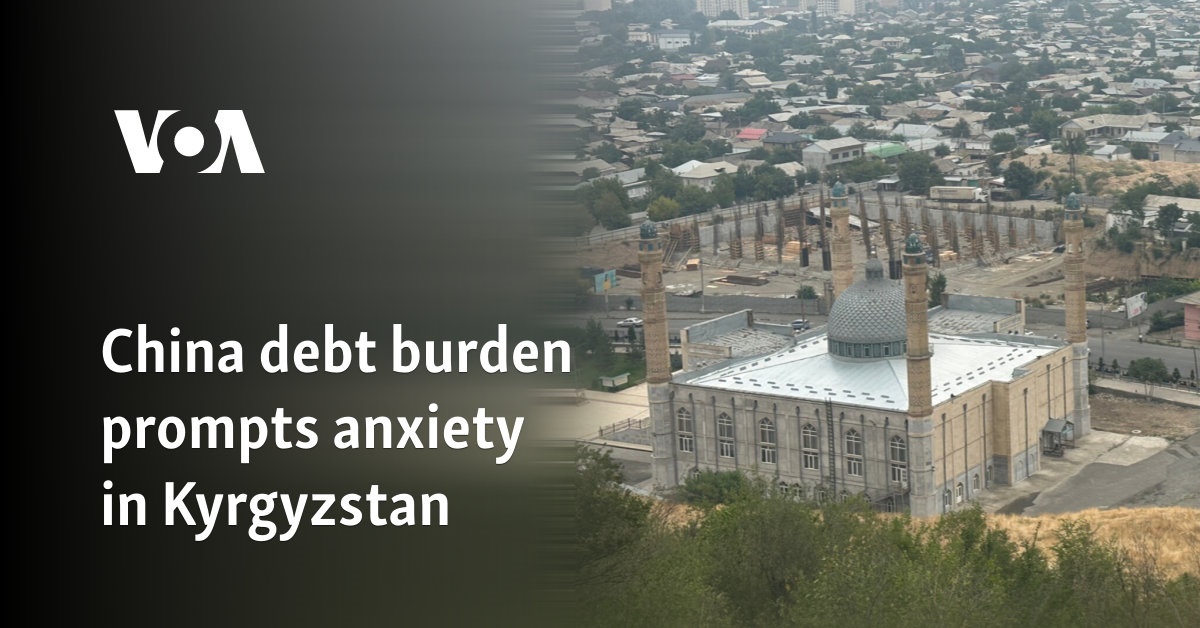Previously deferred debt repayments to China are coming due in Kyrgyzstan, raising public concerns in the Central Asian country about deepening financial dependence on its powerful eastern neighbor.
The country’s total debt accumulated since independence in 1991 is estimated at about $6.2 billion, or 45% of GDP. That is below the debt ratios of some developed countries but problematic in a largely agrarian economy that has been struggling since a change of government in 2020.
About $1.7 billion of that is owed to the Export and Import Bank of China, which agreed in the face of the COVID-19 pandemic in 2021 to put off the repayment of $32 million.
But that is now due for repayment in addition to what would normally need to be repaid, and China is rejecting Bishkek’s proposals for further deferments or alternative repayment schemes.
“We have reached the peak of payments on external debt,” Akylbek Japarov, the chairman of the Kyrgyz Cabinet of Ministers said at a February 2 government meeting in Osh, Kyrgyzstan’s second-largest city.
Japarov said that the servicing of the debt would require the Kyrgyz budget to set aside $400 million in 2024, $430 million in 2025 and $390 million in 2026.
“We are all in the same boat called Kyrgyzstan, so we need the work and contribution of everyone. We must work as one team,” Japarov said at the meeting.
Loans funded upgrades, renovations
Kyrgyz government data show that the Chinese loans financed large infrastructure projects as part of Beijing’s global Belt and Road Initiative. These included a modernization of the capital city’s central heating station, reconstruction of the North-South highway and renovations of the country’s electrical grid.
The loans were to be repaid over 20 years and yield interest at 2 percent a year, the data show.
Faced with a contracting economy, the Kyrgyz government has floated a variety of innovative ideas to manage the debt, including an appeal in November 2020 for private citizens to contribute to a special bank account that would be dedicated to servicing the debt.
As of August 2023, an amount equal to $358,000 had accumulated in the account, government data show.
In 2021, the government considered transferring control over some lucrative mining assets to China as a form of debt repayment but backed off for fear of public protests.
China reportedly rejected the idea in any case but agreed to the $32 million deferral instead.
China rejects alternate plans
As loan repayment deadlines approach in 2024, the public debate has again focused on ways to reduce the burden of repayments.
Kyrgyz officials proposed to China last year that it swap some of its debt for green initiatives; instead of repaying the Chinese loans, Kyrgyzstan would direct the funds to reducing CO2 emissions or investing in renewable energy projects.
China reportedly rebuffed the proposals.
At a news briefing in March 2023, a reporter asked Chinese Ambassador to Kyrgyzstan Du Dewen about the possibility of China restructuring Kyrgyz loans.
“We are not the only ones that decide,” the ambassador replied. “China must observe international norms. All these issues can be discussed in the spirit of friendship and mutually beneficial cooperation to find some form of solution.”
The lack of progress on restructuring has been stoking public fears about what China will do if Kyrgyzstan fails to repay its debt.
In June 2022, Japarov warned that China’s Export and Import Bank could seize control over some key assets such as the Bishkek central heating station and the North-South highway if Kyrgyzstan defaults.
A Bishkek-based expert on China, who requested anonymity in order to speak freely about China, told VOA the issue of debt repayment has become a politically sensitive matter.
“The problem is that we don’t know what China’s long-term strategic goals [for Central Asia] are,” said the expert. “China says that it wants peace in the region, and it emphasizes the importance of strategic collaboration [with Central Asian countries], but many ordinary people do not trust Beijing.”
The expert added that anti-Chinese sentiments have been on the rise in Kyrgyzstan. In 2019 and 2020, Kyrgyzstan witnessed a series of protests directed against Chinese investments in Kyrgyzstan.
The Bishkek-based expert said that that Kyrgyzstan’s financial dependence on China has prompted the government to back Chinese diplomacy in international affairs.
A Chinese government news release issued in May 2023 said that Kyrgyzstan “firmly supports China’s unswerving positions on issues related to Taiwan, Xinjiang, Hong Kong and other core interests, and supports the Global Security Initiative and the Global Development Initiative proposed by China.”
‘We don’t need to worry’
Public sensitivities over Kyrgyzstan’s growing financial dependence on China have prompted Kyrgyz officials to act.
In July 2022, under pressure from Parliament, the Cabinet of Ministers adopted a debt ceiling that states the government must avoid a situation in which the country would owe 45% of its external debt to a single creditor.
In February, Kyrgyz MP Balbak Tulobaev called on the government to fully repay the external debt, including the Chinese loans, using Kyrgyzstan’s gold reserves. The National Bank of Kyrgyzstan, which oversees the gold reserves, dismissed the suggestion as impractical.
Kyrgyz President Sadyr Japarov sought to reassure the public in an April 13 interview with the state news agency Kabar.
“Let’s forget about the topic of external debt,” he was quoted as saying. “Even if our external debt will increase to $10-$15 billion, we don’t need to worry.”
Sadyr Japarov added that “as long as there will be peace and stability in our country, we will repay [loans] without difficulty.”

